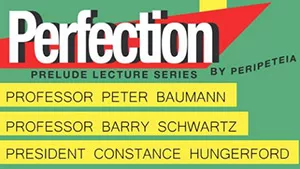Peripeteia Asks, "What Is Perfection?"

Earlier this month, the Peripeteia Planning Committee hosted the first event in its prelude lecture series, focusing on the idea of perfection. Students, faculty, and community members met in the Science Center to discuss whether perfection is attainable, with Interim President Constance Hungerford, Professor of Philosophy Peter Baumann, and Dorwin P. Cartwright Professor of Social Theory and Social Action Barry Schwartz leading the conversation.
Hungerford opened the event by explaining that she regards perfection as unattainable. She reflected on her background as a professor of art history, suggesting that even the great artists like Raphael probably found flaws in their own work, noting that the idea that perfection “gets redefined all the time.”
Baumann followed by suggesting that a perfect life would be a boring life. "A person who is completely successful is unfortunate, ” he said, also criticizing the notion of perfection as “maximum goodness,” which he does not believe exists.
To conclude the opening, Schwartz spoke about perfectionism, a characteristic subject to many psychological analyses. “The aspiration to perfection is what produces some of humanity's greatest achievements,” explained Schwartz, also recognizing that people who try to achieve perfection are usually miserable, never able to find satisfaction in their achievements. He added that for academics in particular, perfection is “the enemy of progress” because professionals are so afraid of being wrong that they pursue safe problems with simple solutions, which are often uninteresting.
After introductions by Hungerford, Baumann, and Schwartz, audience members voiced their thoughts on the subject. Topics ranged from the notion of a perfect circle, which factors heavily into the study of mathematics, to evolution, which has no perfect outcome, to the Constitution, which calls for a “more perfect union,” to Platonic forms. The evening concluded with a debate on whether the pursuit of perfection or of satisfaction is healthier.
The prelude was organized by the Peripeteia Planning Committee, which was established in an effort to reinvigorate the notion of Swarthmore as a liberal arts college, promoting learning and discussion in a setting without grades and in an atmosphere in which professors and students are on the same plane of understanding.
One of Peripeteia’s founders, Victor Gomes ’17 of Gulf Shores, Ala., describes the preludes as “academic jazz” because the events are highly improvisational; speakers are asked not to prepare too heavily. Gomes explained that Professor Baumann suggested perfection as a first discussion topic, and Gomes agreed that it seems a particularly important conversation to have at Swarthmore, an institution at which students notoriously strive for often unachievable perfection in classes.
Gomes hopes to bring more of these mini-seminars - reminiscent of the Friday collections - to campus throughout the spring semester.



